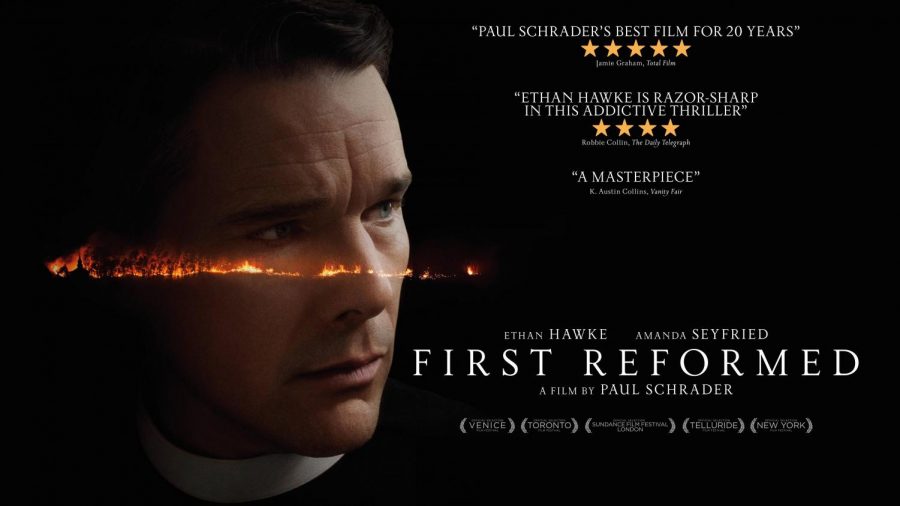Ethan Hawke: Cassavetes Reborn
The movie poster from “First Reformed.”
September 4, 2018
Since he began his career in 1985 with “Explorers,” Ethan Hawke has committed himself to choosing projects he profoundly believes in, from the “Before” trilogy to “Boyhood.” Successes and failures have donned on him, as with any artist, but he stands out in his unwavering devotion to his convictions.
In 2014, he directed a documentary titled “Seymour: An Introduction,” about relatively unknown pianist Seymour Bernstein, after recognizing the beauty of his music. Instead of taking typical leading-man roles in big-budget pictures, Hawke chose to be part of films like “Tape” and “Before Sunset” to work with close friend Richard Linklater and experience filmmaking filled with passion. Undoubtedly, Hawke has had the privilege that others do not to meticulously select his projects, but he consistently takes and runs with every opportunity that this privilege grants him.
In a tremendous career cut short, John Cassavetes took the decades-long art form of filmmaking by the horns and steered it to suit his own creative path — pioneering the now-flourishing genre of independent cinema. Cassavetes made films to express emotion and delve into the boundless human psyche. He made art for the sole purpose of art, and now, Hawke, an unsung king of independent films, is following in Cassavetes’ footsteps and doing the same.
Hawke’s new film “Blaze” — an intimate portrait of musician Blaze Foley — is a reflection of his own integral beliefs. Foley wrote songs so that they would be listened to, not sold; the creation of music for the simple purpose of creating it was his ambition, regardless of fame. As Hawke noted of “Blaze,” it is unlike other music biopics because it never shows the titular musician’s rise to stardom. Foley never did rise to prominent celebrity, but his great achievement lies in the pursuit of unadulterated artistry.
In 2018, Hawke directed and co-wrote “Blaze” and starred in “First Reformed” and “Juliet Naked,” the former of which has catapulted Hawke’s name into the Oscars pool. In Tarkovsky-like style, “First Reformed” grapples with the constant conflict between good and bad, the uncertainty of morality and the nature of God.
It is a film that harks back to an era of filmmaking that used the medium as a platform to ask unanswerable questions and invite the audience to join its stream of consciousness. It is as fitting a film as any for Hawke because it rejects the mold of Hollywood and aims only to exist as itself — a form of art.
Art may not end world hunger or prevent nuclear war, but a life without it is a wasted and empty one. Whether it be music, painting or film, art is a passage to a meditative mind — a mind that contemplates and struggles with emotion and is capable of reaching the limitless breadth of feeling.
This sort of art is making itself known again in independent films, which free themselves from the pressure of commercial triumph and allow creativity to flourish. Ethan Hawke, like Cassavetes did, has dedicated his entire career to making these films and has labored through decades of societal indifference and dismissal. What his slew of releases this year prove is that wholly surrendering oneself to the arts yields creative work that is challenging, provocative and earns its place on the silver screen.
A version of this article appeared in the Tuesday, Sept. 4 print edition. Email Daniella Nichinson at [email protected].




























































































































































